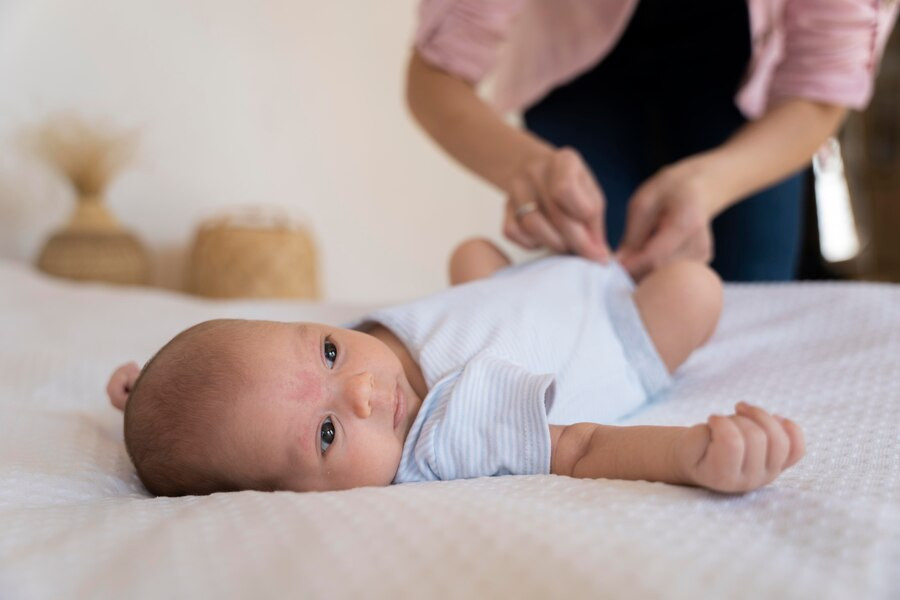Hernia adalah penonjolan jaringan atau organ yang biasanya terjadi di area rentan terhadap kelemahan otot seperti daerah sekitar perut, pangkal paha atau area sekitar pusar. Ini dapat dialami orang dewasa maupun bayi.
Hernia pada bayi biasanya tidak menyebabkan rasa sakit, tetapi berisiko terjepit. Pada saat inilah hernia bisa menimbulkan masalah yang serius.
Hernia yang Paling Umum pada Bayi
Hernia yang paling umum dialami bayi ada dua jenis, yaitu hernia inguinalis dan hernia umbilikalis.
Hernia inguinalis
Hernia inguinalis terjadi ketika bagian dari usus menonjol melalui otot perut bagian bawah (kanalis inguinalis.) Pada bayi laki-laki, hernia inguinalis sering terjadi karena kanalis inguinalis belum menutup sepenuhnya setelah testis turun dari perut ke skrotum.
Pada bayi perempuan, hernia inguinalis dapat terjadi karena kanalis inguinalis terbuka atau lemah sejak lahir. Gejalanya mungkin tidak terlihat di awal, tetap bisa muncul sebagai tonjolan di pangkal paha atau di area skrotum atau labia.
Hernia umbilikalis
Hernia umbilikalis adalah tonjolan dari usus melalui otot di sekitar pusar, di mana tali pusat terletak. Ini bisa terjadi jika otot-otot di sekitar pusar tidak menutup sepenuhnya setelah bayi lahir.
Baca Juga: Cara Membersihkan Tali Pusar Bayi yang Benar dan Aman
Penyebab Hernia pada Bayi
Hernia inguinalis dan hernia umbilikalis pada bayi umumnya disebabkan oleh beberapa faktor umum, di antaranya:
Kelemahan pada dinding otot perut
Salah satu penyebab hernia pada bayi adalah kelemahan atau kegagalan pada otot-otot perut untuk menutup sepenuhnya setelah lahir. Setelah bayi lahir, ada area pada dinding otot perut yang seharusnya menutup sepenuhnya, tetapi terkadang ini tidak terjadi dengan sempurna.
Kelemahan pada dinding otot perut bayi mungkin dipengaruhi selama perkembangan janin, adanya tekanan selama persalinan yang memengaruhi kemampuan otot-otot tersebut, atau paparan zat-zat tertentu selama kehamilan yang dapat memengaruhi perkembangan dinding otot perut bayi.
Baca Juga: Penyebab Sembelit pada Bayi
Kanal inguinalis yang belum menutup sepenuhnya
Pada perkembangan prenatal, testis pada bayi laki-laki biasanya turun dari perut ke skrotum melalui kanalis inguinalis, saluran yang berada di dalam pangkal paha. Saluran ini memiliki peran penting dalam pembentukan sistem reproduksi laki-laki.
Terkadang, saluran ini tidak menutup sepenuhnya setelah testis turun sehingga meninggalkan celah yang dapat menjadi tempat keluarnya jaringan atau organ seperti usus dan menyebabkan hernia inguinalis.
Bayi laki-laki lebih berisiko terhadap hernia inguinalis karena memiliki saluran yang lebih panjang dan besar.
Kegagalan penutupan otot di sekitar pusar
Setelah lahir, tali pusat yang menghubungkan bayi dengan plasenta akan dipotong. Umumnya setelah proses ini, area tempat tali pusat melekat yang disebut umbilikus (pusar) seharusnya akan tertutup oleh otot-otot perut. Namun, pada beberapa bayi, otot-otot di sekitar pusar tidak menutup sepenuhnya sehingga meninggalkan celah yang memungkinkan jaringan atau organ menonjol melaluinya. Kondisi ini disebut hernia umbilikalis.
Hernia umbilikalis lebih umum dialami bayi terutama di minggu-minggu awal kehidupan mereka. Tonjolan ini bisa muncul atau menghilang secara tiba-tiba, tergantung pada pergerakan dan aktivitas bayi. Tonjolan ini lebih terlihat ketika bayi mengejan, menangis, atau ketika otot-otot perut tegang.
Faktor genetik
Apabila di dalam keluarga ada riwayat hernia, maka bayi mungkin memiliki risiko lebih tinggi mengalami hernia. Hal ini disebabkan karena ciri-ciri genetik dapat memengaruhi struktur dan kekuatan dinding otot perut sehingga memungkinkan adanya kelemahan atau kegagalan penutupan area-area tertentu setelah lahir.
Jika mencurigai bayi Anda mengalami hernia, segera konsultasikan dengan dokter untuk mendapatkan evaluasi dan perawatan lebih lanjut. Anda juga bisa memanfaatkan layanan konsultasi kesehatan bersama dokter kami melalui aplikasi Ai Care yang bisa diunduh di App Store atau Play Store.
Mau tahu informasi seputar kehamilan, menyusui, kesehatan wanita dan anak-anak? Cek di sini, ya!
- dr. Monica Salim
John Hopkins Medicine. Hernia in Children and Babies. Available from: https://www.hopkinsmedicine.org/health/conditions-and-diseases/hernia-in-children-and-babies
Mayo Clinic (2022). Diseases & Conditions
Umbilical hernia. Available from: https://www.mayoclinic.org/diseases-conditions/umbilical-hernia/symptoms-causes/syc-20378685
Cleveland Clinic (2022). Inguinal Hernia in Babies. Available from: https://my.clevelandclinic.org/health/diseases/4337-inguinal-hernia-treatment-for-children
Cleveland Clinic (2023). Hernia. Available from: https://my.clevelandclinic.org/health/diseases/15757-hernia
Faiz Tuma, et all (2023). Anatomy, Abdomen and Pelvis: Inguinal Region (Inguinal Canal). Available from: https://www.ncbi.nlm.nih.gov/books/NBK470204/
WebMD (2022). Umbilical Hernia. Available from: https://www.webmd.com/parenting/baby/what-are-umbilical-hernias











